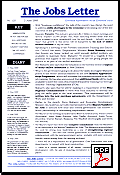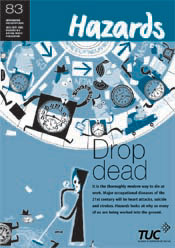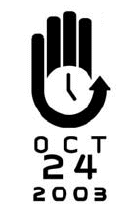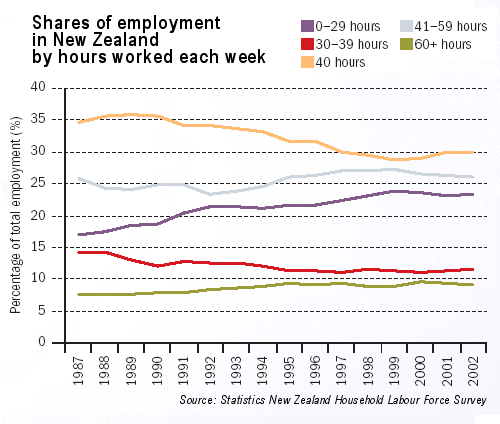



|
 |

|
| No.195 | 29 October 2003 | Essential Information on an Essential Issue |
OVERSCHEDULED. OVERWHELMED.
 Download this issue as a PDF file
“ The cutting edge policy for the future will be centred round the work-life balance area, looking at how people are balancing the demands of work and their life outside work.”
“People with skills can work anywhere in the world. If they do not like the working conditions, they can leave. If we want to attract skilled talent from overseas and retain staff in New Zealand we need to seriously look at work-life balance issues.”
“There is a national economic and social need for New Zealand to address work-life balance. It makes economic sense. It can enhance productivity and increase the quality of work. It can increase job satisfaction, reduce labour costs and help companies retain staff longer. Equally important, work-life balance strengthens families and communities...”
“ Mum, Dad and the kids are all hard at it. 24x7 is the name of the game these days. When and how are families and friends meant to interact when they are expected to fit leisure, education and family around increasingly bizarre work patterns? Lack of time is the greatest impediment to balance and any moves towards saner lifestyles. We desperately need to work fewer hours and more regular hours but all the signals suggest that the opposite is happening ...”
“ It’s not just our workplaces. Our lives in general seem faster, more complicated, more at the mercy of distant powers and principalities. We have less time for our families, and less room to ask where we want to go as a society and as a planet. The very pace of environmental crises, global economic shifts and the threats of war and terrorism make it harder to address them. If we’re to act effectively as engaged citizens, we're going to have to slow down our lives, our culture, and a world that seems to be careening out of control.
“ For the last half century, our tendency has been to consume more, rather than work less. This propensity to work is central to why the United States is among the world’s wealthiest nations as well as the unrivaled leader in resource depletion, carbon-dioxide emissions and environmental impact. By next Labor Day, perhaps, the message will be that we’re slowing down, sharing the work and consuming a little less...”
“ Once we get clear that economic life should be about making a living for everyone rather than making a killing for lucky winners, we begin to see how much of the world’s labour, energy, and material resources are being expropriated by the suicide economy for uses that are profitable for corporations, but harmful to life.
“ So long as there is one man who seeks employment and cannot obtain it, the hours of work are too long.”
“ I heard on the radio the other day that our productivity had gone up 4 percent. I hear that and think, Why aren’t I working 4 percent less? “

The most recent issue of the UK union magazine Hazards has focussed on the growing danger of overwork. The issue is accompanied by a website of resources which is endorsed by the NZ Council of Trade Unions.
 LAST Letter
LAST Letter
NEXT Letter  Index to Features
|
Labour Day was created to celebrate the introduction of the 40-hour working week — a social achievement of the mid 19th century — and one which New Zealand workers were among the first in the world to attain. But Labour Day in this new century is starting to take on a new message: it is becoming a focus for debate on the “time poverty” of our modern life and work styles. And it is becoming a day for us to reconsider the “work-life balance” that was once characteristic of a New Zealand way of life. Despite the optimistic predictions in the 1960s and 70s that the new century would be a golden age of leisure, many New Zealanders say that they are working harder and longer than ever. Whether it is a low-wage worker holding down two jobs to make ends meet, or a professional working late nights and weekends, or a student burdened by part-time work and student debts, or parents rushing to keep up with the weekly timetables of their children ... we are hearing more and more stories of people being overworked, overscheduled and overwhelmed. The fight for a “work-life balance” is once again becoming an important cultural and political issue for New Zealanders. In this special issue, The Jobs Letter looks at local issues and international trends which are shaping this debate over “taking back” our time.
OCTOBER 24: TAKE BACK YOUR TIME DAY Last Friday, October 24th, over a hundred communities in the United States marked the first Take Back Your Time Day, as part of a non-partisan grassroots effort to start a national conversation on “work-life balance”. From next year, the Take Back Your Time Day will be celebrated every fourth Friday in October. This date falls nine weeks before year’s end, and symbolises the amount of additional time — 350 hours, or nine weeks every year — that the average American works compared to the average Western European. Last Friday, October 24th, over a hundred communities in the United States marked the first Take Back Your Time Day, as part of a non-partisan grassroots effort to start a national conversation on “work-life balance”. From next year, the Take Back Your Time Day will be celebrated every fourth Friday in October. This date falls nine weeks before year’s end, and symbolises the amount of additional time — 350 hours, or nine weeks every year — that the average American works compared to the average Western European.
“Medieval peasants worked less than we do,” says John de Graaf, Time Day national coordinator. “Don't get me wrong, Take Back Your Time Day is not anti-work ... but the fact is that life has gotten way out of balance. We are working harder than ever as we are forced to sacrifice the things that really matter like good health and clean environment, active citizenship and social justice and time for nature and the soul ...” The United States figures:
Organisers of Time Day say it is modeled on the first Earth Day, which brought a new environmental awareness to America, and quickly led to the passage of some of the most significant ecological legislation in US history. Organisers hope that the Time Day will have an equally significant and lasting effect on the lives of overworked and stressed-out people. Source –Take Back Your Time Day press releases and Website www.timeday.org; “Workweek Woes” by John de Graaf New York Times 12 April 2003; “Time to Act” by Paul Loeb 1 October 2003 — Alternet; – “What’s the Agenda? Nothing.” by Lini S. Kadaba, Philadelphia Inquirer, 24 Oct 2003
TAKE BACK YOUR TIME HANDBOOKThe Take Back your Time Day website can be found at www.timeday.org
SAMUEL PARNELL TAKES BACK HIS TIMEAs a special Labour Day feature in this issue of The Jobs Letter, we look at Samuel Parnell and his legacy.

WORKING HOURS IN NEW ZEALANDHowever, Work Trends says there has been very little change in this pattern in the past six years. Practically all of the change in working hours took place between 1987 and 1996, especially during the recession years of the early 1990s. Work Trends says that the changes in working hours may be a good thing for many people — e.g. part-timers who want flexibility in their working lives. It also argues that a rising share of people putting in over 40 hours at work “... may be an indication of a vibrant, growing economy”. But the report does concede that these trends reflect problems for some people — part-time work may be a poor substitute for a full-time job, more flexibility can mean more stress, and long hours may lead to burn-out. It says that the challenge for labour market regulators is to ensure that protections exist for vulnerable groups of workers, while “... not hindering the lifestyle improvements for others.” Source – “Work Trends: How work is changing in New Zealand” by Department of Labour 2003 (A Future of Work Programme report)AUSTRALIA’S RACE AGAINST TIMEIn a lead article in the latest Bulletin, David Peetz looks closely at who is working these long hours, and why. Using survey and case study data from Queensland, he concludes that: — Extended hours are mostly driven by employers, though in a minority of cases they are jointly driven by employees who benefit from overtime pay;
The Bulletin argues that these trends indicate that longer working hours are not the only, and certainly not a long-term, means of achieving economic growth. It also concludes that workers may be reaching their own limits and are beginning to “claw back” their time. — “Race Against Time: Extended Hours in Australia”, by David Peetz and colleagues, Australian Bulletin of Labour June 2003, order from the National Institute of Labour Studies at http://www.ssn.flinders.edu.au/nils/publications/abl/abl.php Source — Press Release from Australian Bulletin of Labour June 2003 about “Race Against Time: Extended Hours in Australia”; “Clawing back leisure time” by Professor John Quiggin 17 July 2003 Australian Policy Online http://www.apo.org.au/webboard/items/00365.shtmlTHE WORK-LIFE MUSHROOMBut, a decade later, the jury is still out as to whether these work-life initiatives have made anything more than a dent in the problems of overwork. “ These developments created a blowback effect. Rising hours led to rising incomes, which in turn raised the consumer norms that households adhere to. Prosperity turned more luxuries into necessities and raised aspirations for consumer electronics, larger homes, travel, larger vehicles. But because the gains in income and wealth went disproportionately to upper-income households, most families could only realize higher spending norms by putting in additional hours and taking on debt...”
Source — “Why Americans Should Rest “ By Juliet Schor New York Times 2 September 2002WORK-LIFE INITIATIVES IN NEW ZEALAND Here in New Zealand, the government, unions and groups such as the Equal Opportunities Trust have all undertaken work-life campaigns. Here in New Zealand, the government, unions and groups such as the Equal Opportunities Trust have all undertaken work-life campaigns.
In August this year, Labour Minister Margaret Wilson announced that the government will establish a work-life programme “to develop policies and practices promoting a better balance between paid work and life outside of work” (see The Jobs Letter No.193). Wilson: “The government believes that work is only one dimension of living and should not crowd out and distort family life, recreation and personal development.” The consultation phase of this project begins next month. This will initially be with key stakeholder and community organisations but will be followed by discussions with the wider public (from February next year). People will be invited to say what work-life balance means to them and to give their ideas about what things work well at the moment and what could work better. The government will then consider policy options based on the material gathered and the themes of the consultation. Wilson: “We want to accurately reflect the different realities people face and to get feedback on factors that help people achieve some measure of work-life balance. We want people to identify examples of good practice that could be of use to others and to tell us about it...” Some of the Department of Labour’s policy suggestions for how companies can introduce flexible work arrangements include: time banking, whereby staff can put in more hours at one time which will allow them to take time off later; career break schemes, whereby staff can leave their job for a certain length of time and return to their own job; childcare and eldercare facilities; home working arrangements; school term time working and nine-day fortnights. — The government’s work-balance website can be found at http://www.dol.govt.nz/worklife/index.asp Source – Press Release 24 October 2003 Margaret Wilson “Labour Weekend fitting to talk about work-life balance” and “Work-life Balance:Backgrounder”
UNIONS SAY GET A LIFE!Last week the CTU issued a follow-up discussion paper on work-life balance at their annual conference in Wellington. CTU Secretary Carol Beaumont says that discussion about the meaning of work-life balance has often focussed on such things as free gym memberships and coffee machines at work. But, for unions, the “fundamentals” of decent work are at the centre of this debate. This includes such issues as secure employment, decent pay, leave and working conditions, supported by quality and affordable care arrangements for worker’s families. Beaumont: “ The Government must make sure that laws which set out the minimum code for workers’ pay and conditions take into account the need for balance between work and life. And state sector employers must also recognise and support work-life balance, and ensure it is a basic consideration in policy-making.” — the CTU “Get a Life!” campaign website can be found at www.union.org.nz/campaigns/getalife.html Source – Press Release CTU 24 October 2003 Carol Beaumont “Unions Tackle Barriers to Work-Life Balance”FOUR WEEKS HOLIDAYPrime Minister Helen Clark spoke to the CTU conference last week and gave her strongest signal yet that workers might indeed get an extra week’s annual holiday — but not until after the 2005 elections. She told the CTU that it was never Labour’s policy to introduce the fourth week in the present term of government “... because we have given higher priority to other initiatives benefiting workers and their families.” Clark: “But of course we acknowledge the importance of adequate annual leave in ensuring that workers get proper rest and time for their families and communities, and we acknowledge the increased productivity and social benefit which can flow from enhanced annual leave.” Business New Zealand has estimated that an extra week off will add 2% — or more than $800 million — to the country’s wages bill. But it is impossible from available statistics to tell how many of our 1.54 million wage and salary earners already get more than the statutory minimum leave. The Dominion Post reports that the government may phase in the extra week’s paid leave from 2005, in an effort to lessen employer hostility by giving them more time to adjust. Two extra days could be added in 2005, and one extra day in each of the following three years, giving the full extra week by 2008. Another option the government is looking into is to require a qualifying period of service for workers. Sources — Rt Hon Helen Clark Prime Minister Keynote Address to Council OF Trade Unions' Biennial Conference at Michael Fowler Centre Wellington Thursday, 23 October 2003; New Zealand Herald 24 October 2003 “PM hints that extra week of holiday will follow 2005 poll” by Mathew Dearnaley; The Dominion Post 24 October 2003 “Labour may water down holiday plan” by Vernon Small
STOP SUPERSIZING THE KIDSHis message struck a chord with folks in the Twin Cities suburb of Wayzata about four years ago. Parents have formed a group called Putting Family First, and asked coaches, instructors and youth leaders to cut back practices, rehearsals and meetings. The group also launched a website (www.puttingfamilyfirst.us) and published a Consumer Magazine-style guide to local after-school activities, calculating the time and travel demands involved in pursuing each undertaking. Two years ago, the parents in this affluent community launched Ready, Set, Relax!, a citywide initiative that encouraged frazzled families to put down some speed bumps in their fast-paced lives. The concept was straightforward: on one day throughout the city, the schools would not assign homework. Youth sports teams would cancel practice. Clubs and tutors would schedule no meetings or lessons. And parents would come home from work in time to have dinner with their kids and focus on family matters. The Ready, Set, Relax! day sent a message to parents, schools and sport and recreational clubs to consider slowing down ... producing, as one local businessman put it, a “city-wide sanity check”. Sources – “What’s the Agenda? Nothing.” by Lini S. Kadaba, Philadelphia Inquirer, 24 Oct 2003; “Ready, Set, Relax!” by Sonja Steptoe Time 27 October 2003;A TIME WHOSE IDEA HAS COME? Deep amidst the wide-ranging debates on work-life balance, and the changing “nature of work”, one American labour activist is quietly promoting his own proposal for change: adopt a four-hour working day. Deep amidst the wide-ranging debates on work-life balance, and the changing “nature of work”, one American labour activist is quietly promoting his own proposal for change: adopt a four-hour working day.
Gabe Sinclair is a state-employed machinist who works more hours than he wants to at a hospital in Towson, near Baltimore in Maryland. Three years ago he self-published a novel set in the future about a four-hour working day. He also set up a foundation and a website to promote his concept, which he describes as “a time whose idea has come...” Sinclair: “Go to work tomorrow and then go home four hours later. What would life be like if you could do that every day? What would life be like if work were a five-minute walk away? What would you really do with all that free time? Is the prospect exhilarating or terrifying? “ While the whole idea might be absurd, I personally believe that certain subterranean forces now stir beneath us. Even a slave-owning Thomas Jefferson could say of slavery, “I tremble when I reflect that God is just.” He could anticipate the impending social reversal and sense that his days were numbered. We can take one look at a whole generation of children coming home to houses empty of everything but television and games, and we can see the handwriting on the wall. Certain critical decisions will be made over the next few centuries, and human success will depend upon the depth and courage of our first, tentative meditations...” Sources — www.fourhourday.org; “240-minute Man” by Michael Anft Baltimore City Paper Feature 21 March 2001
|